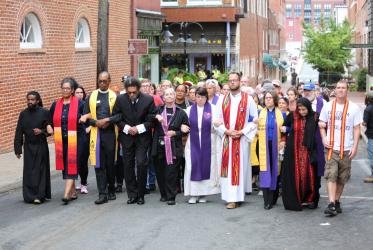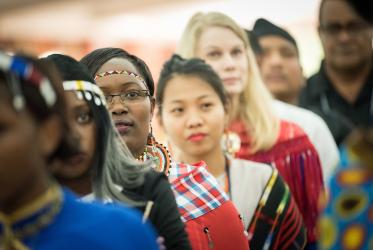At a “Hearing on Racism, Discrimination, Afrophobia and Xenophobia” held at the Ecumenical Centre in Geneva on 25 September, speakers reflected, lamented and, at times, simply sat in silence as they considered the experience of people of African descent in the USA.
The hearing was organised by the World Council of Churches (WCC) in coordination with the National Council of Churches of Christ in the USA (NCCC) as an opportunity to learn about racial discrimination, xenophobia and afrophobia that people of African descent are experiencing in the USA, and acknowledge and reaffirm the role of faith communities as agents of transformative justice in the face of racial injustice.
Prof. Dr Isabel Phiri, WCC deputy general secretary, said racial justice is a vital aspect of a global pilgrimage of justice and peace.
“The pilgrimage is an opportunity to prophetically denounce unjust structures and condemn marginalization and discrimination as well as rampant racism and the interlocking systems of racial discrimination and xenophobia,” said Phiri. “Achieving racial justice is integral to building just and peaceful societies worldwide.”
Several of the speakers at the hearing served on a WCC-led delegation that visited the USA in April 2016 to explore how churches can help achieve racial justice. The racial justice accompaniment visit included the cities of Charleston, South Carolina; Ferguson, Missouri; and Chicago, Illinois.
As she moderated a panel discussion at the hearing, Bishop Mary Ann Swenson (United Methodist Church, USA), vice-moderator of the WCC Central Committee, recalled that visit: “It was so meaningful to me to travel with the community from around the world to the many different places where we visited, and to hear the stories and to think together about what more can we do and what kind of work can we be about,” she said. “It was an important racial justice solidarity visit.”
In opening remarks at the hearing, WCC general secretary Rev. Dr Olav Fykse Tveit, said: “It’s indeed an honor for us to have you here but it’s also a sad reality that we have to have you here. I think we have a momentum of willingness to cooperate on the issues of justice and peace that we might not have seen for many years.”
A spirit of cooperation and collaboration was evident as speakers and the audience focused not only on the painful evidence of racism but on the persistent and seemingly growing collective willingness to do something about it.
“Wiping out these social evils can only be achieved through collaborative efforts,” said Sabelo Gumedze, chairperson of the UN Working Group of Experts on People of African Descent. “The US has a growing human rights movement which has successfully advocated for social change.”
Panelists openly shared their emotional frustration at the current situation the USA is facing with racism. “I know that there are some of us still carrying in our bellies this struggle. This is not a new narrative; this is a very old narrative,” said Dr Iva Carruthers, general secretary of the Samuel Dewitt Proctor Conference."We have moved here from a moment of mass incarceration to a moment of mass criminalization. Mass criminalisation then raises a question: what does it mean to have afrophobia in the context of declaring a whole race of people to be essentially criminalised?”
Participants at the hearing also explored the ties between racism and how the world treats outsiders. “God’s chosen way of reconciliation in Christ was not by being born in a palace but by being born as a dark-skinned refugee child in a police state where the leader had put a death sentence not only on his head but on the head of everyone like him,” reflected Rev. Mike Kinman, rector of All Saints Church in Pasadena, California (USA). “I have to look around and see the world for how it is.”
At times, racism has seemed so deep, wide and pervasive that it becomes overwhelming, the participants agreed. “I am tired of convening. I am tired of talking,” confessed Rev. Traci Blackmon, executive minister of Justice and Witness Ministries for the United Church of Christ. “I am tired of watching the torment of people all over this world.”
Blackmon and others called for a response to racism that includes not only churches but also national and local governments.
“Did you know that the leading cause of death for young black men ages 15 to 34 in the United States of America is homicide?” asked Dr Leah Gunning Francis, vice president for Academic Affairs and dean of the Faculty, Christian Theological Seminary, Indianapolis, Indiana (USA).
“If that were true for white young men ages 15 to 34 in the United States of America, we would see it declared as a public health crisis, there would be federal, state and local resources applied to address the root causes of the issues, and there would be a complete frontal assault against that epidemic but because this is happening to black people we do not see that type of response, we do not see that level of investment,” she said.
In part due to its partnership with the WCC, the NCCC has been able to continue its work for racial justice not only with renewed vigor but with a more specifically designed focus, explained Rev. Karen Georgia Thompson, secretary on the NCCC Executive Committee and Governing Board.
“Coming out of the solidarity visits with the WCC - I was a part of those conversations as well - I think the WCC encouraged the work of truth and reconciliation in the US context,” she said. “What we’re saying is the work of truth-telling has to happen and it has to happen in the lives of our member communions - but also that it is a national work that needs to be done.”
Recording of the “Hearing on Racism, Discrimination, Afrophobia and Xenophobia”, 25 September 2017
World Council of Churches news release on Charlottesville events
Photos from the WCC’s racial justice accompaniment visit to the United States










